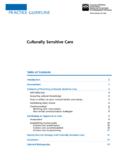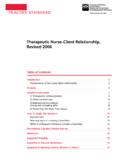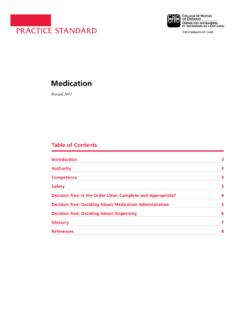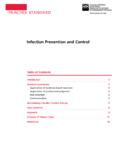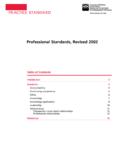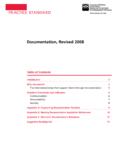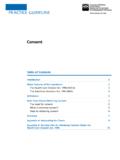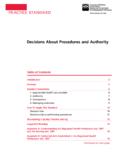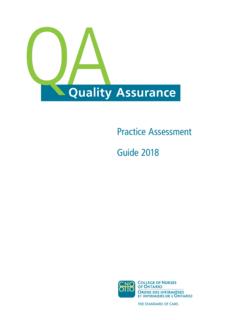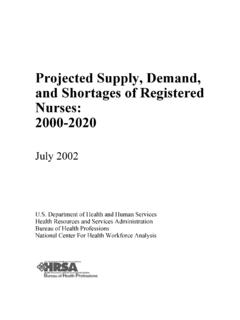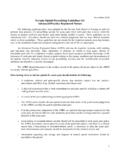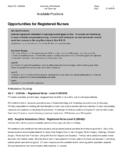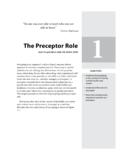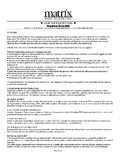Transcription of Competencies Entry-to-Practice - CNO
1 Upd ated 2014 For Ontario registered Practical Nurses Competencies entry -to-PracticeCollege of Nurses of Ontario Entry-to-Practice Competencies for Ontario registered Practical Nurses2 Table of ContentsPreface ..3 Assumptions ..3 entry -level RPN profile ..4 Conceptual framework ..4 Competency statements (Using nursing process and regulatory purposes) .. 6 Practice decision-making framework for entry -level RPNs ..10A guide to practice decision-making for the entry -level RPN ..13 Glossary ..15 References.
2 18 Entry-to-Practice Competencies for Ontario registered Practical Nurses Pub . No . 41042 ISBN 978-1-77116-027-8 Copyright College of Nurses of Ontario, 2014 .Commercial or for-profit redistribution of this document in part or in whole is prohibited except with the written consent of CNO . This document may be reproduced in part or in whole for personal or educational use without permission, provided that: Due diligence is exercised in ensuring the accuracy of the materials reproduced; CNO is identified as the source; and The reproduction is not represented as an official version of the materials reproduced, nor as having been made in affiliation with, or with the endorsement of, CNO.
3 First Published September 1999, revised June 2009, June 2011 . Updated 2014 for Controlled ActsAdditional copies of this booklet may be obtained by contacting CNO s Customer Service Centre at 416 928-0900 or toll-free in Ontario at 1 800 387-5526 .College of Nurses of Ontario 101 Davenport Rd . Toronto ON M5R 3P1www .cno .orgCollege of Nurses of Ontario Entry-to-Practice Competencies for Ontario registered Practical Nurses3 PrefaceIn Ontario, nursing is one profession with two categories: registered nurse (RN)1 and registered Practical nurse (RPN).
4 Nursing is a self-regulated profession, and through provincial and territorial legislation nursing regulatory bodies are accountable for the protection of the public. The College of Nurses of Ontario ensures that RNs and RPNs are safe, competent and ethical practitioners by establishing standards of practice, setting criteria for becoming a nurse in Ontario, administrating a Quality Assurance Program and enforcing standards of practice and conduct. There are areas of overlap between the two categories, but there are differences as well.
5 These differences are based on entry -level and ongoing nursing knowledge and Competencies . It is important to articulate these differences to ensure that the most appropriate care providers are matched with clients. It is also important that RNs and RPNs collaborate with one another to meet client care the fall of 2008, the Entry-to-Practice team, the Practical nurse Program Approval Committee and external stakeholders started to revise the current RPN Entry-to-Practice Competencies because they were dated and did not reflect entry -level RPN practice or current curriculum.
6 The revised RPN Entry-to-Practice Competencies serve as a guide for public and employer awareness of practice expectations of entry -level RPNs. The document also provides a framework to develop educational requirements and curriculum development for academic revised Competencies reflect practical nursing education. They are client-centred and pay special attention to new developments in health care, nursing knowledge and nursing practice. The Competencies aim to ensure that entry -level RPNs are able to function in today s realities and are well-equipped with the knowledge and skills to adapt to changes in health care and nursing.
7 entry -level nurses practice according to College practice documents, including Professional Standards, Revised 2002 and Ethics. This document sets out the Competencies organized according to a conceptual framework consisting of the nursing process and regulatory principles, including professional responsibility and accountability, service to the public, self-regulation and ethical practice. The document also presents assumptions about the preparation and practice of entry -level RPNs, a guide to practice decision-making for entry -level RPNs, a profile of the newly graduated RPN within the context of practice, and a glossary of terms and references to help readers understand and interpret the developing the competency statements the following assumptions were made:1.
8 entry -level RPNs possess the knowledge required to demonstrate the wide range of Competencies in this entry -level RPNs are beginning practitioners whose level of autonomy and proficiency will grow through collaboration and support from the interprofessional health care entry -level RPNs are prepared to practise safely, competently and ethically in situations of health and illness with individuals across the entry -level RPNs are prepared to practise safely, competently and ethically with individual clients, families, groups and entry -level RPNs practice decisions are client-specific and must take into account the environment, the client s circumstances and whether the client s needs can be met by the entry -level entry -level RPNs enter into practice with Competencies that are transferable across diverse practice entry -level RPNs have a knowledge base in nursing, health and social sciences, ethics.
9 Leadership and entry -level RPNs are committed to engaging in quality assurance practices , including Reflective entry -level RPNs use critical thinking skills to support clinical decision-making and reflect upon practice RNs include nurse Practioners and are considered RNs in the Extended of Nurses of Ontario Entry-to-Practice Competencies for Ontario registered Practical Nurses4 entry -level RPN profileThe entry -level RPN is accountable for: All client care she or he provides. All decisions about assigning care to other care providers.
10 Knowing and recognizing her or his competence level (knowledge, skill and judgment) when making decisions and providing care to clients. This includes making decisions to collaborate or alter assignments when her or his competence level does not meet the client s care needs. Knowing and meeting the College s standards of practice and Entry-to-Practice Competencies . Understanding the scope of practice/controlled acts model as documented in the Nursing Act, 1991 and the Regulated Health Professions Act, 1991 (R HPA).
